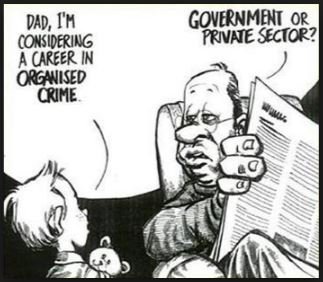The blockchain is surely something for which Satoshi Nakamoto should get a Nobel prize – whoever he might be. It is not even ten years from when Satoshi implement the first blockchain, and the impact on us are growing. We stand at the dawn (the sun is not even up) of this technological concept and what we can do for us. Already in November 2015, a couple got married through posting vows and a legal binding contract on the blockchain Matthew O’Connor/Moneyweb.
The blockchain is a trustless exchange according to Deloitte. It means that two parties can perform a transaction without the oversight of a third. Part of this is that transparency of the transaction exists. In this article, I would like to address the question if the blockchain can be a solution to prevent corruption in government structures?
Corruption

Source
The South Africa government for the last 22 years suffered from #corruption on all its different levels. It took a turn for the worst with the current Zuma administration. R.W. Johnson who is a well respected investigative journalist point out in his book How Long Will South Africa Survive how the Zuma administration is enriching themselves. On local government level corruption is causing poor service delivery which denies people from their constitutional right to have access to clean water Corruption fuels poor service delivery. The corruption watch website provide the following explanation how the allocation of tender deals to contractors work:
“Tender scandal at XXX water service were employees sell tenders for cash enrichment,” said another reporter. “One of the employees put his bother-in-law company to do services there so they can benefit. The same employee has a link between Brits municipality and the Hartebeesport municipality, His brother-in-law benefits from the tenders deals they split the money, the brother-in-law is a policeman staying in a state property as a use state resource for their business.” (Corruption Watch)
What is needed to address Corruption
To solve these crimes a study was done by the Council for the Advancement of the South African Constitution (CASAC) and stated the following:
“Studies suggest that democratic and transparent politics is correlated with low corruption, with freedom of the press and the rule of law having a strong influence on keeping levels of corruption down. Studies further suggest that there may be a significant association between corruption and income inequality, with corruption perpetuating and increasing existing inequalities.”
According to this statement, if the levels of transparency, freedom of press, application of the law and the equality of income can be increased, corruption will decline. The question is how blockchain technology can support the accomplishment of such a goal?
The Blockchain as Solution
Building on the features of blockchain technology as pointed out by Deloitte, it can ensure that:
1.That data cannot be changed or manipulated. The blockchain will make sure that all data about tender requests and tender allocation is auditable.
2.All tender transactions are recorded and always available. The audit process can now pick up patterns of corruption due a complete history of data.
By just focussing on these two features of the blockchain it will ensure transparency over all transactions. This transparency will enable the freedom of the press to report about these deals with the necessary facts. Where needed the law can run it cause with the evidence required to root out corruption. By addressing corruption in this way, it should lead to the desired result where tax money is used to benefit the whole community and hopefully, leads to more equality in income.
I am a firm believer in the potential of the blockchain and also believe that it will change the world as we know it today.
